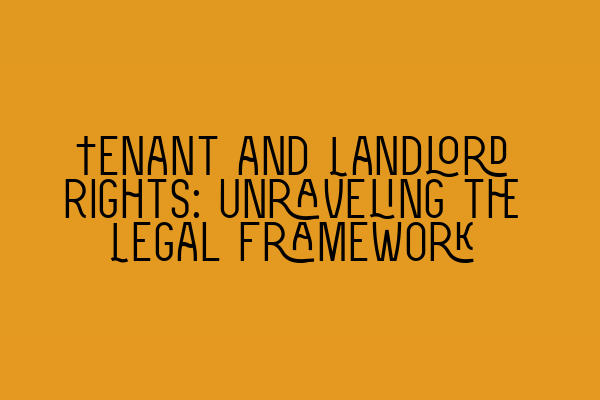Tenant and Landlord Rights: Unraveling the Legal Framework
Introduction
As a tenant or landlord, it is crucial to have a solid understanding of your rights and obligations within the legal framework. The relationship between tenant and landlord is governed by various laws and regulations that are designed to protect both parties. In this blog post, we will delve into the intricacies of tenant and landlord rights, ensuring that you are well-informed and equipped to navigate any potential issues that may arise.
Understanding Tenancy Agreements
The first step in understanding your rights as a tenant or landlord is to familiarize yourself with the tenancy agreement. This legally binding document outlines the terms and conditions of the tenancy, including rent, duration, and responsibilities of both parties. It is essential to thoroughly review and understand this agreement before signing, as it sets the foundation for the entire tenancy period.
Tenant Rights
Tenants have a range of rights that are protected by law. Understanding these rights is crucial for maintaining a healthy and fair landlord-tenant relationship. Here are some key tenant rights you should be aware of:
1. Right to Safe and Habitable Living Conditions: Landlords have a legal responsibility to provide a safe and habitable living environment for tenants. This includes ensuring that the property is free from health hazards, such as mold or pest infestations, and that all necessary repairs are promptly addressed.
2. Right to Privacy: Tenants have the right to enjoy their rented property in peace and privacy. Landlords must provide reasonable notice before entering the rented premises, except in emergency situations.
3. Right to Quiet Enjoyment: Tenants have the right to quiet enjoyment of their rented property, which means they are entitled to live without unnecessary interference or disturbance from the landlord or other tenants.
4. Right to Security of Tenure: In many jurisdictions, tenants have the right to remain in the property as long as they comply with the terms of the tenancy agreement. This protects tenants from arbitrary eviction and ensures stability in their housing situation.
5. Right to Rent Repayment: If the landlord fails to address significant repairs or maintenance issues, tenants may have the right to deduct rent or seek repayment for expenses incurred due to the landlord’s negligence.
Landlord Rights
While tenants have a variety of rights, landlords also have their fair share of protections under the law. Understanding these rights is crucial for landlords to maintain control over their property and ensure a smooth tenancy. Here are some key landlord rights you should be aware of:
1. Right to Collect Rent: Landlords have the right to collect rent from their tenants in accordance with the terms of the tenancy agreement. They may also have the right to increase the rent, as long as the proper notice is given and any legal restrictions are followed.
2. Right to Entry: While tenants enjoy the right to privacy, landlords also have the right to enter the rental property for legitimate reasons, such as conducting repairs or inspections. However, landlords must provide reasonable notice and cannot abuse this right.
3. Right to Evict: In certain circumstances, landlords have the right to evict tenants who breach the terms of the tenancy agreement or engage in illegal activities. This process must be done legally and in compliance with local laws to avoid any potential pitfalls.
4. Right to Property Preservation: Landlords have the right to expect tenants to maintain the property in a reasonable manner. Tenants are typically responsible for keeping the rented premises clean and preventing excessive damage.
5. Right to Recover Costs: If tenants cause damage beyond normal wear and tear or fail to pay rent, landlords may have the right to recover costs through legal means, such as security deposits or small claims court.
Conclusion
Having a clear understanding of tenant and landlord rights is essential for maintaining a harmonious and fair relationship. Whether you are a tenant or a landlord, being well-informed about your rights and obligations within the legal framework can help prevent disputes and ensure a smooth tenancy. Remember, always consult with a qualified solicitor to obtain personalized advice based on your specific circumstances.
